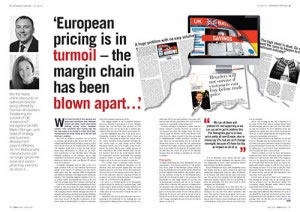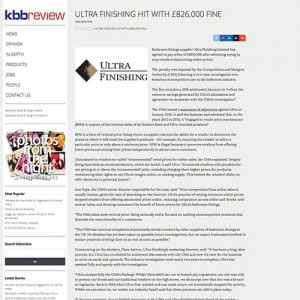‘Who’ll take the hit? We all will…’
With the debate over European bathroom pricing still raging, and the CMA continuing to investigate suppliers suspected of breaking competition law, Tim Wallace asks Liz Hazeldene, managing director of Kohler Mira, how the industry should be reacting
Q: How much of a concern to the industry is it that UK customers can now buy branded products from European websites like Reuter at trade price or less?
A: I understand why Martin [Mongan at Hansgrohe] is very fixated with it because he works for a European brand and will have that problem. I somewhat agree with him that, yes, there should be pricing parity but you can’t just flick a switch overnight and go to the lowest common denominator. What you need to do is work out the premium you can charge for those products in the market, and then what are the other things around it that allow you to have a value proposition.
There isn’t a one-size-fits-all solution. It will be a gradual evolution. And the other bit is the situation with Ultra and the CMA – you can’t fix prices. It’s completely illegal. Retailers can say as much as they want about us needing to protect their pricing. No, what we’ll do as manufacturers is have defendable pricing, so depending on your size and what you provide we’ll have a set of terms. Whether you trade that all the way, or charge a premium because you’re offering other things is up to you, but we cannot price-fix. It’s illegal, I don’t know why people aren’t getting it.
Q: But isn’t it also about suppliers trying to do the right thing for their showroom partners?
A: Yes, and the industry will tiptoe through it and gradually I suspect we’ll end up with more price parity. But European prices aren’t going to go up, so therefore the value will go down in the UK. Who’s going to take that hit? The reality is we all will. It’s a tough one and I don’t think there’s a silver bullet.
Q: Do you think the Bathroom Manufacturers Association should be getting more involved in the debate?
A: Yes the BMA should be right in the thick of it. They should be talking about it, because it’s a body that represents all of us. But it’s driven by its members. So clearly the members of those organisations aren’t driving it, because they’ve either shied away from it, or don’t care, or haven’t engaged in it, or they’re just not seeing it as a threat. But I can see why Martin is engaged in it and Grohe would be as well.
Q: Are you surprised that only Ultra have been fined by the CMA?
A: No, because most people understand it very well and know you can’t do that. Nobody wants to get caught price fixing, so just be ethical.
 Q: Is the internet the biggest challenge facing the bathroom market?
Q: Is the internet the biggest challenge facing the bathroom market?
A: The biggest challenge is how do we innovate? The route to market will sort itself out, we’ll get there, it’s fine. The biggest challenge is what does the consumer want, how is the market evolving and how do we best meet that need?
Q: What do you make of the huge growth in the online channel?
A: Just because there’s a whole chunk of the market that buys on price, it doesn’t mean everyone does. Look at the ageing population, that’s a mega trend. Lots of people want service. Not everyone shops at Lidl and Aldi. How are Waitrose and Sainsbury’s surviving? They focus on experiential.
Q: What’s your advice to showrooms concerned by the rapid growth in internet sales?
A: [Retail expert] Mary Portas sums things up – every 20 years the retail model changes. We’ve had market stalls, then shops, then out of town, now it’s all on the internet. Except it’s not, shoppers are just buying in a different way. The really smart businesses are the ones who evolve. The real smart cookie retailers have an online business as well, and customer service, and fitters, and a design service, and a showroom. If we’re really good at what we do and focus on the end consumer, installer and specifier, and deliver what they want, we shouldn’t be afraid.
Q: But how easy is it for smaller stores to suddenly set up online?
A: Arguably it’s easier! If you’re a big organisation, it’s really flipping difficult. If you’re a B&Q and you get it wrong, cripes you really get it wrong. But if you’re a smaller organisation, you can pick your way through it, learn from your mistakes, keep correcting. Have you ever seen a teenager without a phone in their hand? They’ve never lived in a world without the internet. It’s disruptive technology, so embrace it or choose a different market!
Q: Wouldn’t they need a separate online channel run by separate people?
A: OK, so that’s a business model. Do you want to be in business or not? We have to evolve. Look at Lego, it’s a brilliant example. Eleven-year-olds don’t play with plastic blocks anymore, they watch movies, so guess what? We’ve now got Lego movies, we’ve got Xbox DS games, 360 games. They’re still a global supplier of toys but they’ve completely evolved. The Lego movie made £70 million in its first weekend. Get in the mind-set of ‘what could we do?’
Look at Dolphin 10 years ago – the model was really good, the sad bit was they were ripping people off. But they would project-manage it, and independent retailers can do that. They can pick from the brands they want to.
Q: So you don’t sympathise with showrooms that are being undercut?
A: I get that it’s horrible and I sympathise, but come on guys, you’re entrepreneurs, show us what you can do. It’s exciting. My husband has given up work and become a brewer. It was a market where the big boys took over and took over the pubs. Now it’s about micro breweries. The market is still there, even though people aren’t going to pubs anymore. It’s a lovely example of an evolving market.
 Q: Does the internet have enough strength to eventually squeeze out the small independents?
Q: Does the internet have enough strength to eventually squeeze out the small independents?
A: If the smaller independent allows them to take over, yes. The internet is disruptive technology. If we sit here like Kodak and don’t go into digital we’re deluded. We have to evolve. There’s lots they can still do.
Q: How’s business?
A: Kohler Mira is doing well, but the market is still tough. The market for showers is pretty static. Within that, we’ve got a 42% value share. We’re holding our own, but it’s still not back to pre-recession days. We’re now growing in new markets like trays, enclosures and taps. Kohler is also a growth area and commercial is flying. We have technology that will revolutionise the commercial market and then feed into retail. There’s huge growth in specification. But the crucial bit is the global penetration with the Rada brand. More than half of our sales for Rada are outside the UK. How we develop that is crucial.
Q: What percentage of Mira is manufactured in the Far East?
A: We’re almost 100% assembly here, but by being part of Kohler, which is £6 billion turnover, we’ve got manufacturers in India, China and Europe, but our trays facility in Hull produces all the trays for Europe. But for Mira and Rada and Kohler UK it’s here. We’ve also brought more manufacturing back here.
Q: Has Kohler finally got it right in the UK?
A: It’s taken us a long while to think about how best to take that brand to market. In the US it’s everywhere, but in the UK it’s very much more a premium brand. By almost pulling back and getting that right, we’ve rebased the business and it should now start to grow properly. I won’t shy away from it – we had all kinds of distribution and delivery issues but we’ve worked things out.
Q: Does being part of Kohler help or hinder Mira?
A: It’s fabulous. Herbert Kohler is now executive chairman and David Kohler has taken over as chairman. Herb’s a charismatic entrepreneur. And how amazing for me as the MD of a business of this size to be able to talk to my chairman and for him to know what my business is doing and care passionately. When we said we needed a new manufacturing facility for trays, he said, “here’s a cheque for £6m”. The upside of working for an entrepreneur is that if you go to them with an idea that will pay back, they’ll give you the money. It’s an amazing thing to work for a private business.
Mira is the jewel in the crown and Herb waited a long time to buy this business. He probably paid slightly over the odds, but he knows the value of brands. The trays and baths we’ve developed go all through Europe. They love us for our innovation and we use them globally.
Q: Was the decision to kill the once great Daryl brand a mistake?
A: [Long pause] Hard to say. That could have gone either way. Daryl was an amazing brand, Kohler’s an amazing brand, so I don’t know. It was a good strong brand, but still a very small enclosure business in the grand scheme of things.
You get more bang for your buck by investing in one good brand. The reason that’s not the same for Mira is that it’s a massive brand in its own right. Without doubt we lost something, some of that essence of what Daryl was. But the Kohler brand is £6bn worldwide, so that’s the brand we’re focused on.
Q: Mira dominates the national merchants and the sheds. Does that make it impossible for independent retailers to support it?
A: No, it just means that people can buy it in a multitude of different outlets – that’s where people want to buy them. It might mean that people have to drive harder bargains on those products, but if it’s part of a package of stuff, if it’s not just a shower then of course they can. If it’s part of the bathroom, they make their money on different elements.
Q: Retailers tell us your pricing structure is far too complex…
A: Yes, of course it is. Pricing is the most contentious thing and the way the market has evolved you have pricing that’s not visible and then there’s the ‘inc. vat’ and ‘excl. vat’. Yes it’s way too complicated.
Can I change that? No.